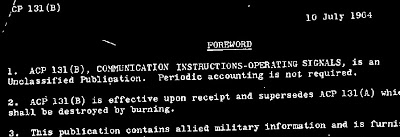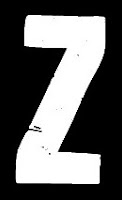 That issue of The Amplifier had a few words that caught my eye. Notably ZCF, ZSF, ZWA, and ZZA. They looked familiar but I couldn't place them in my world of shortwave. I consulted a couple other geeks and one recognized them as military but was unsure. Turned out he was right.
That issue of The Amplifier had a few words that caught my eye. Notably ZCF, ZSF, ZWA, and ZZA. They looked familiar but I couldn't place them in my world of shortwave. I consulted a couple other geeks and one recognized them as military but was unsure. Turned out he was right.Sending data by wireless was difficult. Abbreviation made things faster, so early on there were both formal and informal competing systems. In 1912 the International Radio Telegraph Convention standardized the Q-codes. This was a big step but the European military was already using X-codes, and Cable & Wireless Ltd. was already using Z-codes on their land lines. Cable & wireless is the British Communications company that manufactured the sea cables that interconnect the British empire. In 1942 the U.S. military asked the allies to drop X-codes infavor of Q codes. In the midst of WWII they were willing to standardize.

But strangely the U.S. millitary after WWI moved onto use Z-codes as did NATO. Because of that dual commercial/military heritage some Z-codes have more than one meaning. I'll start with the four above translated to plan English
ZCF - Please check your center frequency
ZSF - Send faster
ZWA - ?
ZZA - ?
Notice those last two are unknown. Let me explain that a little bit. They're used multiple times in the CCC shortwave notes but are not standardized Z-codes. Codes from ZAA to ZXZ are standardized in the military code book. Z-codes from ZYA to ZZZ are reserved for temporary assignments so we can assume these had special meanings unique to the CCC. Perhaps some living radioman of that era will fill us in. More here.
The Z-codes (like the Q-Codes) are standardized today by NATO through the publishing of ACP-131. Howver, it's important to note that the first edition of ACP-131 was published by the U.S. military. Because it was classified at the time I dont have a copy of that edition, btu I do have a pdf of a 1964 edition that was probably close: Here




No comments:
Post a Comment